
|
|
インドの菩提樹
|
インドの「いま」が知りたい−
その言語事情と教育を探って-
名和明宏さんは、インド留学経験があり、現在日本で旅行会社を経営しています。
インドへの渡航歴は数知れないという名和さんに、インド英語や現地の教育について話をうかがいました。
(Dr. Akihiro Nawa spend his students day in India for study. He owns his company at the moment and
He has been to India for many times. Let's listen to his story.)
■
「ヒングリッシュ」について
QUESTION :インド英語の特徴から教えてください。
(First of all, what is Indian English?)
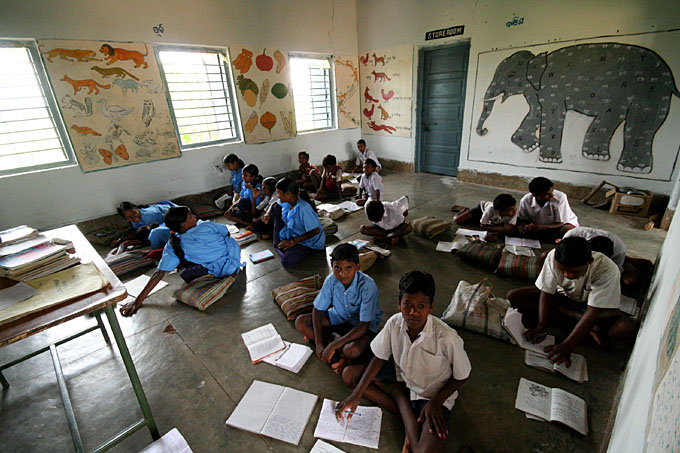
|
|
デジア・コンド族の小学校にて
|
Nawa-san:
A:一般的に「ヒングリッシュ」と呼ばれています。
英語とヒンディー語がミックスしており、現代のインド人の若者(大学生を含め
)はヒングリッシュを使って会話をしています。また、ヒングリッシュにはヒンディー語
の訛りが重なって、初めての人には聞き取れない英語に聞こえますが、基本的にはイギリス英語
で堅い言い回しを使うのが特徴です。
特に「R」の発音が強調されますので、Rの強い英語を使っている人を見ると、どこの国にいて
もインド人だなって分かります。
(It's called "Hinglish" because it's a mix of English and Hindi.
Young Indian people - including college students — speak "Hinglish"
on a day-to-day basis. When you hear it for the first time, it's difficult to understand, because of the accent and because they
use difficult British English expressions.
Another feature is the way they pronounce "r."
You can tell a person is from India by his or her "r.")

|
|
名和明宏さん
|
QUESTION :
インドの言語事情についてはどうでしょう。
(What's the language education situation like in India?)
Nawa-san:
インドはイギリスの植民地であった時代があり、英語を学ぶ機会は十分ありました。
けれど、英語を学べる人々は限られた身分や職業の人だけでした。
それからずいぶん長い時を経て、5〜6年前にインドも教育面で国家予算を倍増させ、
「プロジェクトインディア」と言うスローガンを掲げ、現在ではいろいろな教育の方法
を採用しています。それには、もちろん「英語」に関する授業のことも含まれています。
(India used to be a British colony, and so Indian people had a chance to learn
English. Not all Indian people, though, only thoese who belonged to the upper
classes or who had certain jobs. Time passed, India became indepedent, and about six or seven years ago, the government
started spending a lot of the national budget on education,
under the banner of "Project India." This included English language classes.)
■着実に進む教育改革

|
|
デリーにて
|
QUESTION:
そのプロジェクトについて、具体的にお話していただけますか。
(Could you tell me more about the project?)
Nawa-san:
はい。例えば、私立小学校に通っている子供たちが、村にある国立小学校を訪問して、「僕たちは同じ年齢です。一緒に勉強しましょう」と生徒の勉強を手助けしているケースがあります。
また、インドには28の州がありますが、ケララ州が「プロジェクトインディア」により、識字率100%を達成しました。
(For example, part of the program involves students from private schools visiting
and studying with public-school students in a village. Another feature involves increasing
literacy. In India, there are 28 states
and one of them, Kerala, now has a 100% literacy rate because of this project. )
■インドの教育制度
The Indian education system

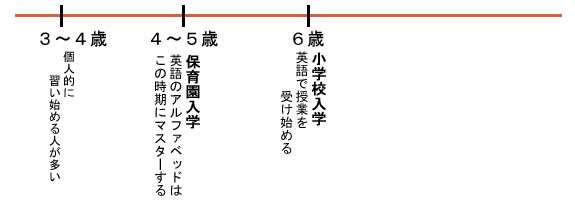
★インドには、義務教育はありません。
(There is no compulsory education in India.)
■鉛筆から何から何まで無料!?(公立の場合)
QUESTION:
インドの小学校のシステムについてはどうでしょうか。
(What is the Indian elementary school system like?)
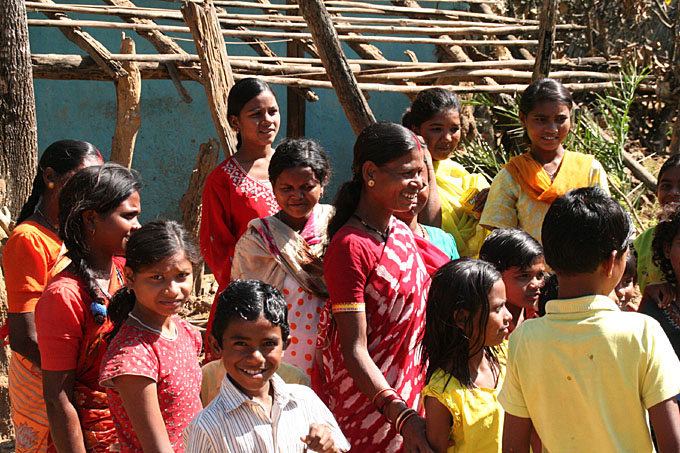
|
|
ナラヤンプールにて
|
Nawa-san:
まず、大きく分けて「国立小学校」「私立小学校」の二校があり、「私立小学校」では英語を始め、算数、スポーツなどの教育も充実しています。
(There are public and private schools. In private elementary schools, they teach subjects like English, Maths, and P.E.)
「国立小学校」は、私立のような授業料を払えない子供たちが教育を受けています。
鉛筆、ノート、制服までもが無料で国から支給されるほか、朝8時とお昼には無料の給食が与えられます。そして、女の子を学校に行かせると、
こういった支給品以外にも現金が支給され、就学率は急増しています。女の子は勉強せず家の仕事だけしていた時代があったのですが、だいぶ変わりました。
(In public elementary schools, there are a lot of students who cannot pay high tuition fees.They receive textbooks, pencils, even
uniforms free of charge. Meals are served twice a day -at 8 a.m. and at lunch time. The families of female students also receive money.
That's why school attendance has been increasing dramatically of late, particularly among girls, who traditionally stayed a
home to help their family.)
QUESTION :
英語の授業についてはどうでしょうか。
(How about English class?)
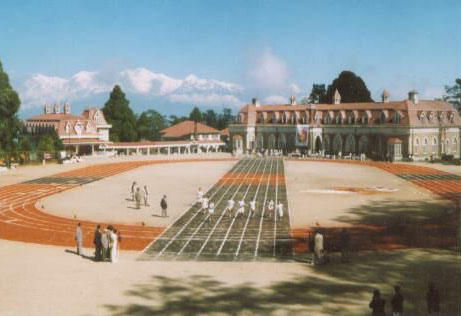
|
|
ダージリンにある私立の小学校
|
Nawa-san:
「国立小学校」でも「英語」の授業が毎日1時間あります。
「私立小学校」では、授業はどんな科目も英語で行なわれ、文法を含めた高度な英語教育を受けます。(click here)
(They study English every day for one hour, even at National elementary school.
At private elementary school, all the subject is
taught in English and they learn high level English education, including grammar.)
QUESTION :
一般的に、英語はいつから学び始めるのでしょうか。
(When do they start to learn English in general?)
Nawa-san:
幼稚園の時点で、ABCのアルファベット、果物や生活用品の英語、数字の数え方を学びます。
(In kindergarten, they start learning the alphabet and the names of fruit. They also learn other useful words that you might use in day-to-day life, and they learn how to count.)
※筆者のコメント:(ちなみに サイトに登場してくれたほとんどのキッズ達も「英語を学び始めたのは4歳ぐらい(幼稚園)から」と答えてくれました。
サイトの一番下にある☆これまでのインド特集☆をご覧ください)
※voice of writer: ( This rings true. Most of the kids who appeared on this site said they started learning English from kindergarten.)

|
|
ナレンドラブル村・踊る子供たち
|
QUESTION :
日本の小学校で英語が必須科目になるかもしれませんが、どう思われますか。
(English may become a compulsory subject at public elementary schools in Japan. What do you think about that?)
Nawa-san:
日本も積極的に英語を学ぶべきです。過去、英語教育が推進されなかった時代もありますが
、世界標準として考えると、学習能力の高い小学校のときから英語を学ばせるのは良いことと思います。
(I think Japanese kids should be taught English. It's true that learning English hasn't
always been encouraged in this country, but considering the globalization of today's society,
I think it would be a good idea to master English from as early an age as possible.)
☆これまでのインド特集☆
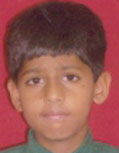
 第一週目−−夢は「科学者」・「いい人」になること---(Click here!)
第一週目−−夢は「科学者」・「いい人」になること---(Click here!)

 第二週目−−夢は「ファッションデザイナー」・「歴史学者」になること
第二週目−−夢は「ファッションデザイナー」・「歴史学者」になること

 第三週目−−夢は「先生」・「パイロット」になること---(Click here!)
第三週目−−夢は「先生」・「パイロット」になること---(Click here!)

 第四週目−−夢は「大物実業家」・「エンジニア」になること---(Click here!)
第四週目−−夢は「大物実業家」・「エンジニア」になること---(Click here!)

 第五週目−−夢は「お医者さん」・「空軍パイロット」になること---(Click here!)
第五週目−−夢は「お医者さん」・「空軍パイロット」になること---(Click here!)
第六週目−−二人のファテマちゃん---(Click here!)
第七週目−−インド人の英語を聞いてみよう---(ちょっぴり聞きやすくしました***Click here!****)
第八週目−−僕・わたしの一日---(空手に英文学?インドの小学生の時間割***Click here!****)
|
